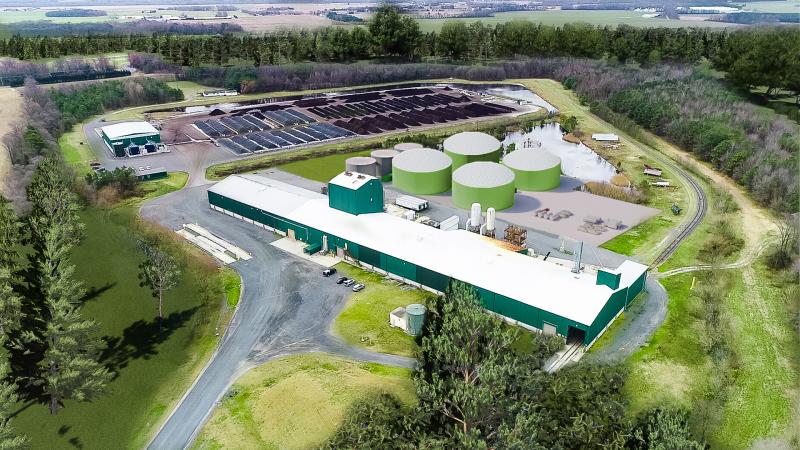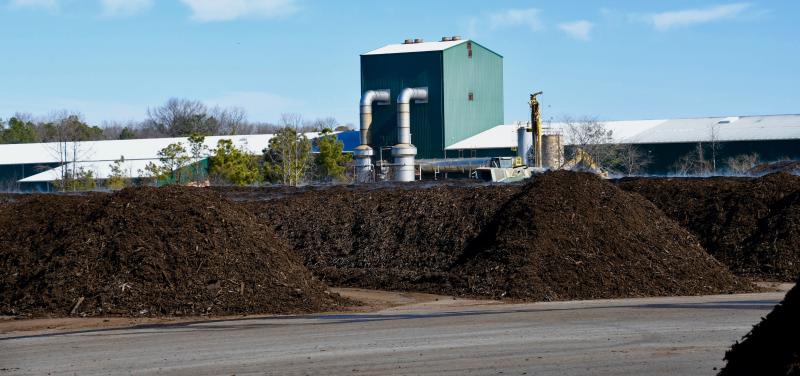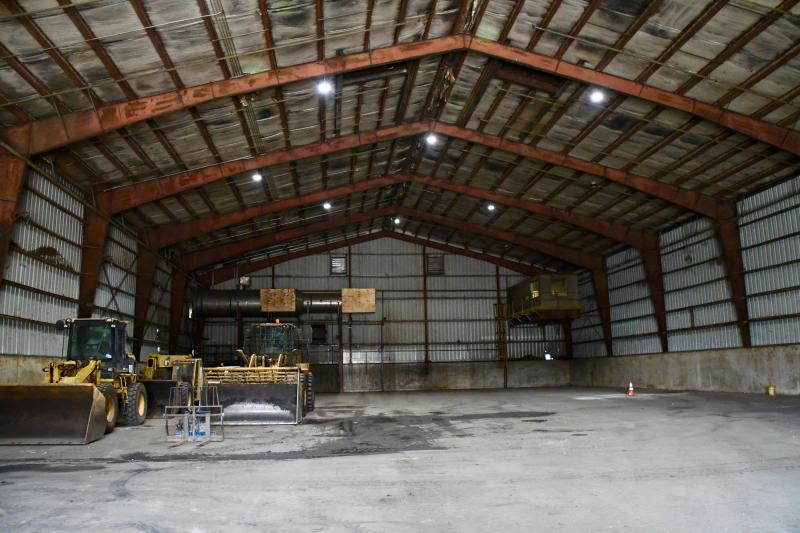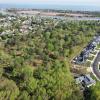Debate over Bioenergy’s facility continues
While plans for Bioenergy DevCo's poultry processing waste recycling plant have been approved by Sussex County officials, the debate over the project continues as the company starts the process of obtaining permits from the Delaware Department of Natural Resources and Environmental Control to operate the facility.
Bioenergy DevCo, based in Annapolis, Md., plans to convert poultry processing waste, known as DAF, and poultry house litter into natural gas and compost using an anaerobic digester process at its composting facility south of Seaford off Route 13A.
The company has a 20-year contract with Perdue Farms to process its DAF. The company already operates a composting facility at the site known as the Bioenergy Innovation Center.
As a first plant of its kind in the region, Bioenergy DevCo officials say the new facility is a major step forward in dealing with an ongoing issue – how to dispose of poultry waste in an environmentally responsible manner.
Sussex leads nation in production
Sussex County is the leading poultry broiler producer in the nation and a major part of the poultry industry’s $3.4 billion total annual economic impact on Delmarva.
Groups opposing the Seaford-area plant, which plan to try to block the DNREC permits, say the facility will only intensify the problem by bringing in poultry waste from plants throughout Delmarva. Opponents say monetizing waste disposal removes incentives for poultry companies to better manage their waste and will lead to an increase in factory farming.
They say the areas in and around Sussex County contain among the highest concentration of poultry houses and plants in the nation.
On June 1, advocates representing Food & Water Watch, Concerned Citizens Against Industrial Animal Feed Operations, Socially Responsible Agriculture Project and Sussex Health & Environmental Network held a virtual press conference to voice their concerns about what they call Delmarva’s factory farm biogas threat.
Factory farming
Sam Moller, a Bioenergy DevCo spokesman, said the company has invited Food & Water Watch and other groups with concerns to tour the facility, and all turned down every invitation.
He went on to say that the groups are not opposed to the technology of anaerobic digestion but rather to factory farming, not just on Delmarva, but across the nation.
“We all know that agriculture, and the poultry industry, is vital to the community’s development and sustainability,” he said.
Factory farming is another term for intensive animal farming designed to maximize production and minimize costs. Debates are ongoing across the nation as to the pros and cons of factory farming.
Phoebe Galt of Food & Water Watch in Washington, D.C., said the organization does not accept that factory farming is the baseline for how the poultry industry must operate. “And we refuse to accept the premise that factory farms are here to stay in Delaware,” she said. “A heavily concentrated industry, the factory farm model wreaks havoc on independent producers, traps contract farmers into cycles of debt and carves out local economies.”
She said the answer to dealing with the area's excessive poultry waste problem is to produce less waste, not to monetize its creation.
Debate over digesters
Moller said there has been no opposition to an anaerobic digester facility Bioenergy DevCo is building in Jessup, Md., which is designed to recycle organic food waste. “Their opposition in Sussex County is because of Perdue. If they were opposed to the technology, there would be equal opposition to the facility in Jessup,” Moller said.
In conjunction with Maryland Food Center, the plant will process 100,000 tons of food waste each year into renewable natural gas.
“The process of anaerobic digestion is done completely in an enclosed, monitored and tested environment,” he said. “The company has a proven track record, having built 240 plants and operating more than 140 worldwide, with zero incidents.”
He said the current handling of DAF and other poultry waste is to land-apply it and load it on trucks for transport to out-of-state landfills and incinerators. “With so much waste, it’s a problem that has to be addressed now. Anaerobic digesters are a sustainable way of dealing with organic waste,” he said. “If we keep the status quo, the problem will only be exacerbated. We have a solution to deal with the problem now.”
Galt said digesters like the ones proposed by Bioenergy DevCo create methane gas and monetize the ongoing generation of pollution with business-as-usual practices for the poultry industry. “Bioenergy's facility will bring more waste into Sussex County to feed the digester, all of which will still need to be managed and ultimately land-applied, in all likelihood,” Galt said.
“By creating a market for waste and monetizing its production, factory farm biogas incentivizes the buildout of more factory farms and processing plants, deepening our economic reliance on the destructive and deadly form of agriculture that is daily spurring on the climate crisis,” said Greg Layton, Delaware organizer with Food & Water Watch. “The project moving forward in Delaware is a canary in the coal mine for what is to come should biogas buildout continue unchecked in Delmarva – Gov. Carney must pursue proactive state policy to check the buildout of this dirty industry before it’s too late.”
“Factory farm biogas is just another assault on the public health of Black and brown communities, and the right to breathe clean air and drink pure water," said Maria Payan, senior regional representative for Socially Responsible Agriculture Project, and co-founder of Sussex Health & Environmental Network. “To bring other states' factory farm processing waste into Sussex County's poor minority communities is reprehensible. This isn't clean energy – it's an ugly scheme to benefit industrial poultry polluters despite opposition from hundreds of local residents.”
CIB: Part of the solution
The local Delaware Center for the Inland Bays is not opposed to the Bioenergy DevCo plant. Chris Bason, executive director, said an anaerobic digester would be part of the solution for healthier water quality in Sussex County.
He said with two other proposed CleanBay Renewables plants in Georgetown and Westover, Md., nearly half of the poultry litter produced on Delmarva would be recycled.
Sussex County officials approved a plan in August 2018 for a $60 million CleanBay Renewables project to recycle up to 90,000 tons of litter annually from poultry houses at a plant located off Route 113 south of Georgetown. The plant will convert the waste to electricity and fertilizer.
Plans for Bioenergy DevCo plant
Plans for the $40 million-$45 million plant include a 165,000-gallon equalization tank for the DAF slurry, which is about 10 percent solids and 90 percent water; four 1.3 million-gallon anaerobic digester tanks for DAF sludge and water; and two 1.3 million-gallon fermentation tanks. Plans also include a new wastewater pretreatment facility and an enlarged stormwater retention pond.
While most of the water used in the process from on-site wells will be recycled and used again, the plant will generate up to 60,000 gallons of treated wastewater per day at full capacity. The current plan is to transport the wastewater to a Sussex County facility for disposal with possible connection to a central sewer pipeline in the future.
DAF, or dissolved air flotation, is the liquified end product of wastewater treatment at poultry processing plants. A DNREC permit would allow up to 220,000 tons of DAF and litter per year to be recycled at the proposed plant.
In the anaerobic process, poultry waste in the digesters is heated and constantly mixed for about 30 days. Microorganisms break down the material, which is called digestate. A centrifuge would be used to remove excess water from the digestate, with the remaining solid material transferred to the composting facility. There it would be processed with wood waste to make organic compost.
The microorganisms release biogas, which is a mixture of methane, carbon dioxide, water vapor, and traces of hydrogen sulfide and ammonia. The gas will be captured and scrubbed as part of the facility's process.
Chesapeake Utilities will take the biogas off site, clean it to renewable natural gas and inject it into the company's natural gas pipeline.
ON DELMARVA
2020
Farmers raised 570 million chickens equalling 4.2 billion pounds
5,036 poultry houses
Industry provides $3.4 billion in economic value
18,000 poultry company jobs
$1 billion in feed purchases
IN DELAWARE
2020
$1.7 billion economic impact
More than 9,600 direct jobs and 29,000 associated jobs
700 poultry farms
Poultry processing plants in Sussex County
Mountaire Farms, Millsboro and Selbyville
Perdue Farms, Georgetown
Allen Harim Foods, Harbeson
























































